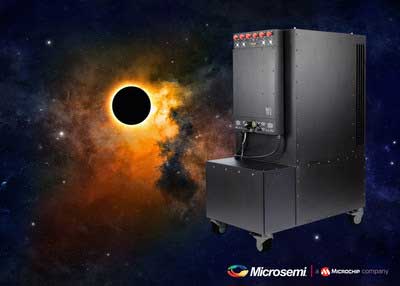Do you know what ensures the precision in timing and frequency of applications related to metrology, global navigation, and deep space research? It is all run by commercially available atomic clock technology. Microchip Technology Inc. is working to meetup with requirements of such demanding apps through its subsidiary called Microsemi. What they are offering is a hydrogen maser atomic clock named MHM-2020 that improves the usual long-term stability performance.

Fig. 1: Image Showing A Maser MHM-2020
This one is a higher improvement over the last one, the MHM-2010. But it does leverages the long service life of its predecessor along with its cost-effectiveness. The MHM-2020 promises a much upgraded experience with addition of a touch panel screen and a very secure network management port.
Hydrogen masers are known for delivering stability by working on a thumb of rule that under proper circumstances, the hydrogen atoms emit microwaves at precisely 1420405751 Hz frequency. Efforts for phase-locking of such extremely high-purity and less-power consuming signals up to an extended high-performance quartz oscillator leads to a clock output signal with much required phase noise and long-term stability that enables keeping precision in time keeping.
Most active hydrogen atoms happen to be the most advanced commercially available atomic clocks generated by Microchip. This quadruplicates the overall stability of most passive hydrogen masers while offering much superior short-term stability against the cesium based beam tube atomic clocks. The MHM-2020 maser makes use of a completely novel drift-compensation feature that significantly improves the aging performance and long-term clock drift. The two happen to be most critical elements for timekeeping and metrology applications.
Features
- This one takes roots in the legacy of MHM 2010 that establishes new industry expectations for a long service life as well as much lower cost of ownership.
- The better performance allows MHM-2020 one of the most preferred choices for the national labs that is working in sync with the Bureau International des Poids et Mesures standards for keeping up the standards of UTC (Coordinated Universal Time) all over the world.
- It allows the users to achieve <3E-16/day long-term aging with better temperature stability and much lower magnetic field sensitivity.
- The short-term clock stability performance of maser falls between 1-100 seconds range keeping up with the most stringent needs of VLBI (Very Long Baseline Interferometry) for several radio astronomy researches like studying up blackholes as well as other apps that need timing reference, precise frequency, and low noise.
What Maker Has To Say?
The general manger and vice president of Microchip’s frequency and time business unit, “As the leading supplier of commercial atomic clock solutions, Microchip continues to invest, develop, and deliver new capabilities to our customers. The MHM-2020 maser builds upon the widely valued heritage of the current MHM-2010 product and we are offering the past five years so they can benefit from Microchip’s technology advancements without having to purchase a new system.”
Filed Under: News


Questions related to this article?
👉Ask and discuss on EDAboard.com and Electro-Tech-Online.com forums.
Tell Us What You Think!!
You must be logged in to post a comment.